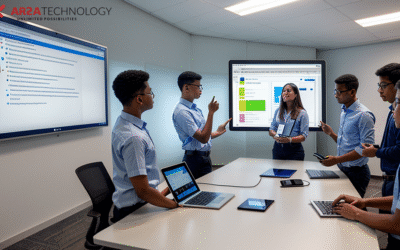Introduction: Overcoming Modernizing Legacy IT Systems in the Government Industry
Government agencies worldwide face a critical mandate: to deliver efficient, transparent, and accessible services to their citizens. Yet, many are hampered by the persistent challenge of modernizing legacy IT systems. These outdated infrastructures often lead to inefficiencies, security vulnerabilities, and a significant drain on resources, directly impacting public service delivery. One particularly resource-intensive area is the manual transcription of countless meetings, hearings, and public consultations – a process that is slow, prone to error, and costly.
ARSA Technology understands these unique challenges. We believe that the path to a more agile, responsive, and data-driven government lies in leveraging advanced AI capabilities through accessible, high-performance APIs. Our Speech-to-Text (STT) API offers a powerful solution, enabling government entities to transition from cumbersome manual processes to automated, highly accurate transcription workflows, fundamentally transforming how information is captured, managed, and disseminated. This guide explores how our STT API can be the cornerstone of your agency’s modernization efforts, driving efficiency, transparency, and significant cost savings.
The High Cost of Legacy: Why Government Needs Modernization
Legacy IT systems in government are not merely inconvenient; they represent a tangible barrier to progress. For decades, agencies have relied on manual methods for documenting crucial discussions, from legislative sessions and policy meetings to citizen feedback forums. This reliance results in:
- Delayed Information Dissemination: Manual transcription is time-consuming, delaying the availability of critical information to stakeholders, policymakers, and the public.
- High Operational Costs: Employing dedicated transcription staff or outsourcing these services incurs substantial recurring costs, diverting funds from other vital public services.
- Inconsistent Accuracy: Human error, varying transcription standards, and the sheer volume of audio data can lead to inaccuracies, potentially impacting legal, policy, and historical records.
- Limited Accessibility: Untranscribed audio or poorly indexed text makes it difficult for citizens with hearing impairments or those seeking specific information to access public records effectively.
- Data Silos and Underutilization: Manual transcripts often remain in disparate formats, making it challenging to centralize, search, and analyze this rich data for policy insights or trend identification.
- Security and Compliance Risks: Outdated systems may lack the robust security features required to protect sensitive government communications, leading to potential compliance breaches.
These challenges underscore the urgent need for a strategic shift towards modern, AI-powered solutions that can automate and streamline these foundational processes.
ARSA Technology’s Speech-to-Text API: A Catalyst for Government Transformation
ARSA Technology’s Speech-to-Text API is engineered to address these pain points directly. It provides a robust, scalable, and highly accurate solution for converting spoken language into written text, making it an ideal tool for government agencies aiming to modernize their operations. Our API is designed for seamless integration into existing IT infrastructures, empowering developers and solutions architects to build next-generation applications without overhauling entire systems.
At its core, the ARSA STT API offers:
- Exceptional Accuracy: Leveraging advanced deep learning models, our API delivers industry-leading accuracy, even in challenging audio environments, ensuring that critical details from government meetings are captured correctly.
- Multilingual Support: In a globalized world, government agencies frequently interact across linguistic boundaries. Our API supports multiple languages, enabling comprehensive transcription of diverse international dialogues and internal communications.
- Scalability for Enterprise Needs: Government operations generate vast amounts of audio data. Our API is built to handle high volumes, scaling effortlessly to meet the demands of large-scale transcription projects, from daily departmental meetings to extensive public inquiries.
- Security and Compliance Focus: We understand the stringent security and compliance requirements of government. Our infrastructure and API design prioritize data privacy and integrity, providing a reliable platform for sensitive government data.
To see the API in action, demo the Speech-to-Text API and experience its capabilities firsthand.
Automated Meeting Transcription: The Cornerstone Use Case for Government
The most immediate and impactful application of our Speech-to-Text API in the government sector is automated meeting transcription. Imagine a world where every council meeting, parliamentary debate, committee hearing, and inter-agency discussion is instantly transcribed, indexed, and made searchable. This isn’t a futuristic vision; it’s a present-day reality with ARSA Technology.
Here’s how automated meeting transcription transforms government operations:
- Enhanced Efficiency and Productivity: Eliminate the need for manual transcription, freeing up staff to focus on higher-value tasks. Meetings can be processed immediately after conclusion, dramatically reducing turnaround times for official records.
- Improved Record-Keeping and Archiving: Generate precise, timestamped transcripts that serve as definitive records. These digital archives are easily searchable, ensuring that historical context and specific decisions can be retrieved instantly, supporting accountability and informed policy-making.
- Boosted Transparency and Accessibility: Make public meetings and proceedings more accessible to all citizens, including those with hearing impairments, by providing immediate, high-quality transcripts. This fosters greater public trust and adherence to accessibility mandates.
- Data-Driven Policy Insights: Transcribed meeting data can be a goldmine for analysis. Agencies can use these texts to identify recurring themes, track policy discussions, gauge public sentiment, and inform future strategic decisions. This moves government towards a more evidence-based decision-making model.
- Streamlined Legal and Regulatory Compliance: For agencies dealing with legal proceedings or regulatory oversight, accurate and timely transcripts are paramount. Our API ensures that all verbal communications are documented meticulously, aiding in compliance and dispute resolution.
- Facilitating Global Collaboration: For international government bodies or agencies working with foreign counterparts, the multilingual capabilities of our highly accurate transcription API are invaluable. It enables seamless transcription of discussions involving multiple languages, breaking down communication barriers and fostering stronger international relations.
Integrating the Speech-to-Text API: A Strategic Advantage
For solutions architects and engineering managers, integrating ARSA Technology’s Speech-to-Text API is a strategic move that future-proofs government IT infrastructure. The API is designed for ease of use, allowing developers to quickly incorporate powerful transcription capabilities into existing applications or build new ones. Instead of grappling with complex machine learning models, your team can leverage our pre-trained, high-performance API to achieve immediate results.
The integration process focuses on sending audio data to our service and receiving the transcribed text. This modular approach means you can enhance specific applications – like a digital meeting platform, a public records management system, or a citizen engagement portal – without disrupting your entire ecosystem. This agile modernization approach minimizes risk and maximizes return on investment.
Consider the potential for synergy: once you have accurate text transcripts, you can further enhance citizen interaction. For instance, you could use the transcribed text as input for other AI services, such as natural language processing for sentiment analysis, or even integrate with our generate natural voice responses with our TTS API to create interactive voice assistants that can answer citizen queries based on official meeting outcomes. This creates a powerful, interconnected AI ecosystem for government services.
Beyond Transcription: The Broader Impact on Government Services
While automated meeting transcription is a primary driver, the benefits of ARSA’s Speech-to-Text API extend far beyond. Government agencies can leverage this technology to:
- Improve Call Center Efficiency: Transcribe customer service calls for quality assurance, agent training, and to identify common citizen concerns, leading to better service delivery.
- Enhance Intelligence and Security Operations: Convert intercepted audio or surveillance recordings into searchable text, aiding in threat analysis and intelligence gathering.
- Digitize Historical Audio Archives: Preserve and make accessible valuable historical audio recordings by converting them into digital text, ensuring their longevity and discoverability.
- Support Judicial and Law Enforcement: Automate the transcription of court proceedings, police interviews, and evidence recordings, improving accuracy and speeding up legal processes.
- Personalize Citizen Interactions: By understanding spoken queries, agencies can route citizens more effectively and provide more personalized information, reducing frustration and improving satisfaction.
The strategic value of a reliable voice-to-text API for government is immense, touching every facet of public administration and service. When considering how to use Speech-to-Text API, the focus should always be on how it empowers your agency to be more responsive, efficient, and transparent.
Addressing “How to Use” and “Pricing” for Government Adoption
For government agencies and their technical teams, understanding “how to use Speech-to-Text API” translates to understanding its seamless integration and robust support. ARSA Technology provides comprehensive documentation and support resources to ensure a smooth adoption process. Our API is designed for developers, by developers, with clear guidelines for incorporating its functionality into diverse applications.
Regarding “Speech-to-Text API pricing,” ARSA Technology offers flexible and transparent pricing models designed to accommodate the varied needs and scales of government projects. We understand that government budgets require careful planning and predictable costs. Our approach focuses on delivering exceptional value, ensuring that agencies can achieve significant ROI through efficiency gains and reduced operational expenditures. We encourage prospective government partners to engage with our team to discuss specific project requirements and explore tailored solutions that align with their budgetary frameworks and long-term strategic goals. Investing in ARSA’s STT API is an investment in future-proofing public services.
Conclusion: Your Next Step Towards a Solution
Modernizing legacy IT systems is not just an upgrade; it’s a strategic imperative for government agencies aiming to serve their citizens more effectively in the digital age. ARSA Technology’s Speech-to-Text API offers a proven, powerful, and secure pathway to achieving this. By automating critical functions like meeting transcription, agencies can unlock unprecedented levels of efficiency, transparency, and accessibility, transforming operational workflows and enhancing public trust.
The journey from manual, resource-intensive processes to agile, AI-powered solutions begins with a clear vision and the right technology partner. ARSA Technology is committed to empowering government agencies with the tools they need to build a more responsive, data-driven future. We invite you to explore the transformative potential of our Speech-to-Text API and take the next step in your agency’s modernization journey.
Ready to Build with ARSA Technology?
Start integrating our powerful APIs today. Get your free API key, explore the interactive documentation, and see how quickly you can bring your project to life.







